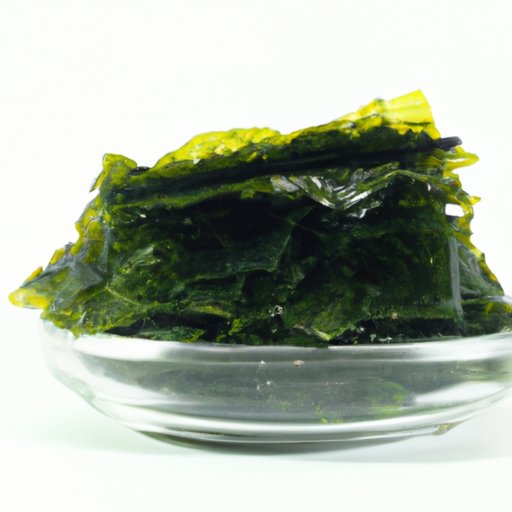
Introduction
Trying to lose weight can be an uphill battle, but there are several nutritional options that may be of help. One such option is incorporating seaweed into your diet. Seaweed has long been a popular ingredient in many Asian cuisines and has gained popularity in the Western world as a superfood. Can incorporating seaweed into your diet help you to lose weight? This article explores the science, usage and benefits of seaweed for weight loss.
The Science Behind Seaweed as a Weight Loss Aid
Seaweed is rich in nutrients that are beneficial for our health. One of these nutrients is iodine, which plays a vital role in regulating thyroid function, metabolism and energy production. Additionally, seaweed is high in fiber, which helps to keep you fuller for longer. Fiber also helps to regulate digestion, prevent constipation and maintain stable blood sugar levels. Seaweed also contains a natural compound called fucoxanthin, which has been shown to have fat-burning properties. A study published in the Journal of Medicinal Food found that fucoxanthin reduced body weight, body fat, and visceral fat in obese participants when taken daily for 16 weeks.
How Incorporating Seaweed Into Your Diet Can Help You Shed Pounds
If you are interested in incorporating seaweed into your diet, there are a variety of ways to do so. Firstly, you can find seaweed products such as nori sheets, dulse, kombu and wakame at your local grocery store or online. You can add seaweed to your meals in many ways, such as making sushi rolls with nori wraps, using kombu in soup broths, adding dulse flakes to salads or roasting wakame to make a crispy snack. There are also a variety of seaweed-based products that you can purchase, such as seaweed pasta and seaweed chips.
Here are a few sample recipes to incorporate seaweed in your diet:
- Seaweed salad – a mix of seaweed, cucumber, sesame seeds and a dressing made of sesame oil, soy sauce and rice vinegar
- Nori wraps – filling made of avocado, cucumber, crab meat, and brown rice, wrapped in nori sheets
- Wakame soup – a broth made of chicken or vegetable stock, wakame seaweed, vegetables, and tofu
Replacing high-calorie, low-nutrient foods with seaweed-based dishes can be beneficial in creating a calorie deficit, leading to weight loss. Additionally, seaweed dishes are often low in calories. For example, one sheet of nori seaweed used in sushi rolls contains only ten calories.
Seaweed: A Natural Appetite Suppressant
Incorporating seaweed into your diet can help to suppress appetite. Seaweed’s high fiber and protein content work together to create a sense of fullness and satisfaction. A study published in the journal Appetite found that consuming seaweed supplements helped participants to reduce their calorie intake by up to 20%. Lower calorie intake can help you to create a calorie deficit, leading to weight loss.
The Benefits of Seaweed for Weight Loss and Overall Health
Seaweed has a range of nutritional benefits that support overall health and wellness, in addition to weight loss. Seaweed is a source of anti-inflammatory and antioxidant compounds that can help to combat oxidative stress and inflammation in the body. Reducing inflammation in the body can help to lower the risk of chronic diseases such as cancer, heart disease, and diabetes. Seaweed is also rich in essential vitamins and minerals such as vitamin C, vitamin K, and calcium, which are essential for bone health, immunity, and other bodily functions.
Seaweed Supplements: Do They Work for Weight Loss?
There are a variety of seaweed supplements on the market that claim to help with weight loss. These supplements include capsules, powders and liquids that contain seaweed extract. While some studies have shown that taking seaweed supplements may lead to weight loss, more research is needed to confirm the effectiveness of these products. Additionally, seaweed supplements can sometimes have side effects such as upset stomach, diarrhea, and allergic reactions. Therefore, it is important to talk to your doctor before starting any supplement regimen.
Adding Seaweed Into Your Diet Plan for Sustainable Weight Loss
Adding seaweed into your diet plan can be part of a sustainable, long-term approach to weight loss. It is important to note, however, that seaweed should not be the only means of weight loss. Instead, seaweed can be a useful tool to supplement a diet that is rich in whole foods, lean protein, and healthy fats. Here are some tips to help you incorporate seaweed into your diet plan:
- Start small – try adding one seaweed dish per week to start. As you become more comfortable with the taste and texture, you can gradually increase your intake.
- Portion control – even though seaweed dishes are often low in calories, it is important to watch your portion sizes. Consuming too much seaweed can lead to potential risks such as excessive iodine intake, which can lead to thyroid issues.
- Variety – mix up the types of seaweed that you use in your dishes to keep things interesting and to benefit from different nutrients.
- Read labels – if you are purchasing seaweed-based products, read the labels to ensure that they do not contain any additives or excess salt or sugar.
Conclusion
Incorporating seaweed into your diet can be a beneficial and sustainable means of supporting weight loss and overall health. Seaweed is rich in fiber, protein, and essential vitamins and minerals that support bodily functions. It can also be a natural appetite suppressant, leading to lower calorie intake and weight loss. However, it is important to remember that seaweed should be a supplement to a well-balanced diet that includes whole foods, lean protein, and healthy fats. With proper portion control, variety, and preparation, seaweed can be an enjoyable and beneficial addition to your daily meals.




